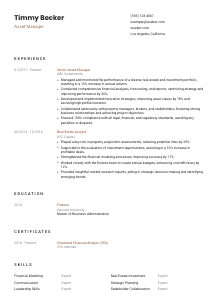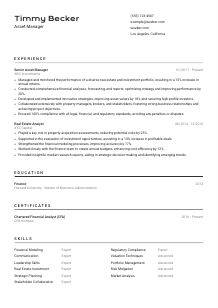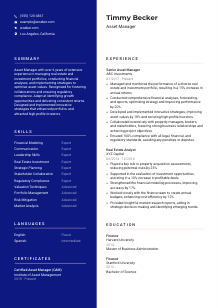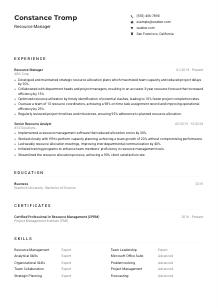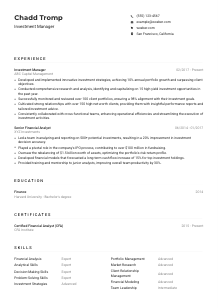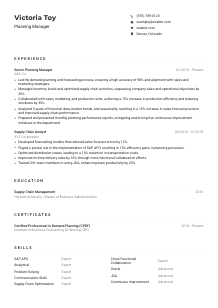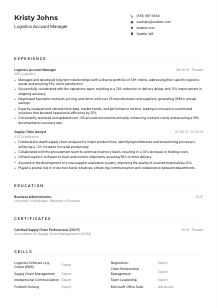Asset Manager Resume Example
Balancing portfolios, but your resume lacks equity? Dive into this Asset Manager resume example, structured with Wozber free resume builder. Learn how to position your investment insights to match job expectations, propelling your career as solidly as your managed assets!

How to write an Asset Manager Resume?
Greetings, aspiring Asset Manager! Embarking on your job search journey with a resume that stands out is essential, especially in the competitive field of asset management. Here, your resume is not just a document; it's the first introduction to your future employer, demonstrating your professional prowess and strategic acumen.
By utilizing the Wozber free resume builder, we'll guide you through tailoring your resume to the Asset Manager position with precision, making it compelling and catered specifically to the roles you're aspiring to capture. Let's sculpt your professional narrative to secure your spot in the asset management arena!
Personal Details
The Personal Details section of your resume provides the crucial first impression, serving as a professional greeting to potential employers. In the Asset Manager field, ensuring this information is both precise and aligned with the job requirements is crucial. Let's explore how to refine this section, emphasizing its importance in your Asset Manager resume.
1. Highlight Your Name Prominently
Your name is your professional brand. Make sure it's prominently displayed in a clear, professional font. This isn't just about aesthetics; it's about ensuring your name sticks in the hiring manager's mind from the get-go.
2. Job Title Alignment
Directly beneath your name, align your professional title with the job you're after. In this instance, "Asset Manager" sends a clear message that you're not just in the industry, but you're ready and equipped for this specific role.
3. Essential Contact Information
Include your phone number and a professional email address. A minor typo can mean a missed opportunity, so double-check these details. Remember, firstname.lastname@email.com lays the foundation for a professional depiction.
4. Location Matters
"Must be located in Los Angeles, California." Clear and straightforward, right? If you meet this criterion, make it known in your contact details. This instantly reassures the hiring manager of your logistical suitability for the role.
5. Professional Online Presence
If you have a LinkedIn profile or personal website showcasing your professional achievements or portfolio, include it. Ensure it's up-to-date and reflects the professionalism of your resume.
Takeaway
Before moving on from the Personal Details section, ensure it's polished, concise, and resonates with the requirements of an Asset Manager role. Your personal details are the initial handshake with potential employers, so make it count.





Experience
The Experience section is where you get to shine, delving into your professional contributions and successes. Tailoring this segment to reflect the Asset Manager role is key to demonstrating your fit and readiness for the position. Here's how to craft an experience section that aligns perfectly with the expectations of the role.
- Managed and monitored the performance of a diverse real estate and investment portfolio, resulting in a 15% increase in annual returns.
- Conducted comprehensive financial analyses, forecasting, and reports, optimizing strategy and improving performance by 20%.
- Developed and implemented innovative strategies, improving asset values by 18% and securing high‑profile investors.
- Collaborated extensively with property managers, brokers, and stakeholders, fostering strong business relationships and achieving project objectives.
- Ensured 100% compliance with all legal, financial, and regulatory standards, avoiding any penalties or disputes.
- Played a key role in property acquisition assessments, reducing potential risks by 25%.
- Supported in the evaluation of investment opportunities, assisting in a 10% increase in profitable deals.
- Strengthened the financial modeling processes, improving accuracy by 17%.
- Worked closely with the finance team to create annual budgets, enhancing cost‑efficiency by 12%.
- Provided insightful market research reports, aiding in strategic decision‑making and identifying emerging trends.
1. Dissecting the Job Requirements
Carefully examine each requirement listed in the job description. For an Asset Manager, managing real estate and investment portfolios and conducting financial analyses are critical. Highlight your direct experiences that match these requirements.
2. Presenting Your Roles
Begin with your most recent position, clearly listing the job title, company name, and dates of employment. This structuring makes it easy for hiring managers to track your career progression.
3. Crafting Targeted Achievements
"Managed and monitored the performance of a diverse portfolio, resulting in a 15% increase in annual returns." This targeted achievement directly addresses the job description and showcases quantifiable success, making it a compelling inclusion.
4. Quantify Your Success
Whenever possible, use numbers to quantify your achievements. Metrics like "improved asset values by 18%" or "secured high-profile investors" speak volumes of your capability to drive results.
5. Relevancy is Key
Stick strictly to experience that spotlights your asset management skills and successes. Every bullet point should echo the essential demands of the job description, ensuring a tailored narrative.
Takeaway
In the Experience section, every achievement, every role, every date plays a part in the holistic picture of your qualifications. This is where you prove not just your competence, but your excellence in the field. Tailor it with precision, ensuring each point resonates loudly with the role of an Asset Manager.
Education
Although the Asset Manager role is experience-driven, your educational background forms the foundation of your knowledge and expertise in the field. Here's how to position your education strategically on your resume, echoing the specific requirements of the job.
1. Identify Key Educational Prerequisites
The job description mentions: "Bachelor's degree in Finance, Real Estate, or a related field." Ensure to display your highest relevant degree prominently, ideally aligning directly with the job criteria.
2. Simplify the Structure
Maintain a clear, concise format listing the degree title, field of study, institution, and graduation year. This straightforward presentation allows recruiters to quickly assess your educational fits.
3. Align Degree Titles
If your degree directly matches one requested in the job description, make sure it's the first thing listed. For example, "Master of Business Administration in Finance" showcases a perfect alignment with the needs of an Asset Manager role.
4. Consider Relevant Coursework
List key courses or certifications that bolster your candidacy for the Asset Manager position, especially if they're directly relevant to the job description's demands.
5. Other Academic Achievements
While your degree is paramount, don't shy away from mentioning honors, relevant extracurricular clubs, or significant projects if they further demonstrate your fit and passion for the asset management field.
Takeaway
Your educational section is subtly powerful, reflecting a foundation that supports your practical experience. Tailor it to resonate with what the employer seeks for an Asset Manager, presenting yourself as a well-rounded and thoroughly qualified candidate.
Certificates
In the world of asset management, professional certifications can significantly strengthen your resume, showcasing your dedication and expertise. Let's frame your certificates to reflect the unique requirements and preferences for an Asset Manager role.
1. Highlight Relevant Certifications
"Certification such as the Chartered Financial Analyst (CFA) or Certified Asset Manager (CAM) is a plus." If you have these certifications, they must be front and center, signaling your advanced knowledge and commitment to the field.
2. Selectivity is Your Friend
Prioritize listing certifications that resonate directly with the job requirements. This strategic choice ensures hiring managers quickly see your qualifications that matter most for the Asset Manager role.
3. Showcase Dates where Relevant
Including the date of certification or recertification can be particularly impactful, demonstrating your currency and dedication to staying ahead in the field.
4. Stay Proactive in Your Learning
The field of asset management is ever-evolving. Regularly seeking out new certifications or courses, especially those that align with your career goals, demonstrates a proactive approach and a drive for excellence.
Takeaway
Your certificates are not just accolades; they're proof of your ongoing commitment to excellence in asset management. By carefully selecting and presenting these, you highlight your dedication and readiness for advanced responsibilities in the field.
Skills
Your skills section is a concise showcase of your professional capabilities. Let's ensure it reflects the competencies an Asset Manager needs to excel, directly tying them to the job requirements and making your resume truly ATS-compliant.
1. Extract Skills from the Job Description
Identify both the explicit and implicit skills demanded in the job posting—"proficient in financial modeling and valuation techniques" and "strong communication" are clear examples.
2. Match and Highlight Your Relevant Skills
For each skill listed in the job description, match it with your own. Prioritize those where you excel and ensure these are prominently featured on your resume, tailored for the Asset Manager role.
3. Prioritize Organization
Avoid cluttering your resume with every skill you possess. Focus on those most relevant to an Asset Manager, ensuring each skill adds value and speaks directly to the job requirements.
Takeaway
Your skills section should not just tick boxes; it should resonate with confidence and capability. By aligning your skills with the demands of the Asset Manager position, you're signaling to hiring managers that you're not only a strong candidate but the right one for the role.
Languages
In the interconnected world of asset management, language skills can set you apart, offering glimpses into your cultural dexterity and global mindset. Let's tailor this section to underline your linguistic skills, enhancing your appeal for the Asset Manager position.
1. Assess the Language Requirements
"High level of fluency in English required." If the job lists specific language requirements or preferences, make sure to address these fully, placing them prominently in your resume.
2. Prioritize Key Languages
Start with the languages most relevant to the job, indicating your proficiency levels clearly. For an Asset Manager, fluent command of English and any additional languages that might benefit global portfolio management are worth highlighting.
3. Showcase Additional Linguistic Abilities
Beyond the required languages, listing others you're proficient in can underscore your adaptability and readiness for roles involving international communication or dealings.
4. Be Honest and Precise About Proficiency
It's vital to be honest about your language proficiency levels. Misrepresenting your abilities can lead to awkward situations and challenge your credibility.
5. Consider the Role's International Scope
For roles with an emphasis on international markets, your language skills can significantly enhance your candidacy. They reflect your ability to navigate diverse markets and cultures effectively—an invaluable asset in global asset management.
Takeaway
View each language you list as a testament to your global reach and cultural sensitivity—traits highly valued in asset management. These skills can open doors, making you not just a candidate, but a globally-minded asset manager ready to take on the world's markets.
Summary
Your summary is the narrative hook of your resume, inviting hiring managers to delve deeper into your qualifications. Let's ensure your summary aligns with the Asset Manager role, capturing your unique value and readiness for the challenges ahead.
1. Digest the Job Essence
Take a moment to fully understand the role and its requirements. An Asset Manager's essence revolves around portfolio management, financial analysis, and stakeholder collaboration.
2. Lead with a Strong Introduction
Kickstart with a statement that introduces you as a professional, emphasizing your years of experience and areas of expertise directly related to asset management.
3. Highlight Your Unique Contributions
Pinpoint specific skills or accomplishments that set you apart for the Asset Manager role. For instance, "Implemented innovative strategies, improving asset values by 18% and securing high-profile investors," directly mirrors desired qualifications.
4. Keep It Precise and Powerful
Your summary should be sharp and to the point. Aim for 3-5 lines that encapsulate your professional identity, leaving hiring managers eager to learn more.
Takeaway
A well-crafted summary sets the tone for the rest of your resume, ensuring you're seen as a compelling candidate for the Asset Manager role. By focusing on what makes you distinct and how you meet the job's demands, your resume starts on a confident and convincing note.
Launching Your Asset Manager Journey
Congratulations on taking this detailed walkthrough towards crafting a standout Asset Manager resume. This journey doesn't just end here; it's the beginning of a promising path in the rich field of asset management. With your resume polished, tailored, and ATS-optimized using Wozber's free resume builder and ATS resume scanner, you're ready to make your mark. Remember, your resume is the story of your professional achievements.
Keep it updated, reflective of your growth, and aligned with your career ambitions. The asset management world is ready for your expertise. Dive in and chart your course to success!

- Bachelor's degree in Finance, Real Estate, or a related field.
- A minimum of 5 years of experience in asset management, real estate investment, or a similar field.
- Proficient in financial modeling and valuation techniques.
- Strong communication, interpersonal, and leadership skills.
- Certification such as the Chartered Financial Analyst (CFA) or Certified Asset Manager (CAM) is a plus.
- High level of fluency in English required.
- Must be located in Los Angeles, California.
- Manage and monitor the performance of real estate and investment portfolios.
- Conduct regular financial analyses, forecasting, and reporting on asset performance.
- Develop and implement strategies to optimize asset values and mitigate risk.
- Collaborate with various stakeholders including property managers, brokers, and investors.
- Ensure compliance with all legal, financial, and regulatory standards.





